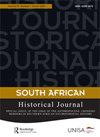The Imperialist Dream of João Albasini, a Portuguese Trader in South-East Africa, 1847–1870
IF 1
3区 历史学
Q1 HISTORY
引用次数: 0
Abstract
ABSTRACT In the early nineteenth century, João Albasini established himself as a slave and ivory trader at Delagoa Bay, current-day Maputo, Mozambique. In the 1850s, he moved west, crossing the Lubombo Mountains into the northern areas which in 1852 became the Transvaal, also known as the Zuid-Afrikaansche Republiek. He aimed to revive the Portuguese economy at Delagoa Bay through the trading possibilities offered by the Boer population inland. In 1953, the Afrikaans historian Johannes Bernadus de Vaal gave a detailed account of Albasini’s life. He, however, did not consider the Portuguese and Mozambican dimensions to Albasini’s economic activities in the Transvaal because he saw him as a true-blue Transvaler determined to promote the Zuid-Afrikaansche Republiek’s interests. While Albasini did attach himself to the Afrikaner community, he remained a staunch Portuguese patriot. He dreamt of establishing a Portuguese colony in current-day Mpumalanga to further Portugal’s hypothetical authority in Delagoa Bay’s hinterland. Although deeply interesting, De Vaal’s analysis lacks insight into the obstructive nature of the Portuguese policy towards the economic development of the Zuid-Afrikaansche Republiek. However, the independent spirit of the Boers (the Dutch population) and the lack of political will and resources of the Portuguese metropole stifled João Albasini’s imperialist dream.1847-1870年,葡萄牙商人jo奥·阿尔巴西尼在东南非洲的帝国主义梦想
19世纪初,jo奥·阿尔巴西尼在德拉戈阿湾(今莫桑比克马普托)从事奴隶和象牙贸易。在19世纪50年代,他向西迁移,越过卢邦博山脉进入1852年成为德兰士瓦省的北部地区,也被称为南非荷兰语共和国。他的目标是通过内陆布尔人提供的贸易机会,重振德拉戈亚湾的葡萄牙经济。1953年,南非荷兰历史学家Johannes Bernadus de Vaal详细描述了阿尔巴西尼的一生。但是,他不认为阿尔巴西尼在德兰士瓦的经济活动有葡萄牙和莫桑比克的方面,因为他认为阿尔巴西尼是一个决心促进南非荷兰语共和国利益的真正的德兰士瓦人。虽然阿尔巴西尼确实与阿非利卡人社区关系密切,但他仍然是一个坚定的葡萄牙爱国者。他梦想在今天的普马兰加省建立一个葡萄牙殖民地,以进一步巩固葡萄牙在德拉戈亚湾腹地的假想权威。德瓦尔的分析虽然非常有趣,但缺乏对葡萄牙对南非荷兰语共和国经济发展政策的阻碍性质的洞察力。然而,布尔人(荷兰人)的独立精神和葡萄牙大都市缺乏政治意愿和资源,扼杀了阿尔巴西尼的帝国主义梦想。
本文章由计算机程序翻译,如有差异,请以英文原文为准。
求助全文
约1分钟内获得全文
求助全文
来源期刊

South African Historical Journal
Multiple-
CiteScore
0.70
自引率
0.00%
发文量
37
期刊介绍:
Over the past 40 years, the South African Historical Journal has become renowned and internationally regarded as a premier history journal published in South Africa, promoting significant historical scholarship on the country as well as the southern African region. The journal, which is linked to the Southern African Historical Society, has provided a high-quality medium for original thinking about South African history and has thus shaped - and continues to contribute towards defining - the historiography of the region.
 求助内容:
求助内容: 应助结果提醒方式:
应助结果提醒方式:


